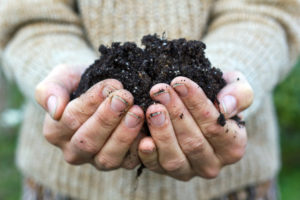Been thinking about composting? We’ve got the dirt on this time-tested practice.
A case could be made that our forebearers were the original environmental warriors and green advocates, using and reusing every resource available—from bacon fat and manure right down to their clothing. Recycling was a necessity—every resource and material was hard-won and valuable, and therefore very little was wasted or thrown away. Our ancestors couldn’t just run to their local superstore and buy something new. They learned to make what they needed, value what they had, and find other purposes for things that had outlived their original use.
The history of composting goes back centuries, possibly millennia. The Romans and Greeks used some form of mixing organic materials for topsoil and mulch. Centuries after that, Shakespeare and Sir Walter Raleigh extolled the virtues of composting. Native American tribes used every bit of what they hunted or harvested, right down to sinew and bone. They were expert composters who taught some of the European settlers. Early American composting proponents include Thomas Jefferson, James Madison and George Washington Carver.
Composting takes the things we can’t eat or use, like vegetable peels, eggshells, coffee grounds and lawn clippings, and creates a medium that helps new things grow. It’s environmentally friendly, reduces solid waste in a natural way, and provides huge benefits for yards, gardens and crops. Microorganisms break down the organic materials and produce a dark, rich, crumbly material that can be used as fertilizer, mulch, topsoil and potting soil.
“It creates a really nice bacterial organic breakdown—nutrient rich soil that’s beneficial for your garden,” offers Maxine Hunter, resident horticultural agent at the University of Florida and International Society of Arboriculture-certified arborist. “It’s really important that it reduces our carbon footprint.”
What you need to know before you begin composting:
If you use lawn clippings, make sure they haven’t been treated with chemicals or pesticides. Some chemicals can cycle out of the soil quickly, but others do not.
You cannot compost meats or oils. Cooked food may also attract rodents to your garden.
It’s important that the compost temperature reaches 122-130 degrees to kill off bad bacteria and weed seeds. If it does not reach this temperature, then weed seeds may be reintroduced into the garden when the compost is used.
Turn your compost regularly to mix the materials.
Using manure in home composting can be risky. Raw animal manure can contain disease-causing organisms like E. coli and salmonella that can lead to illness when produce contaminated with those organisms is consumed. Make sure you study up on the proper process if you plan to use manure.
Be sure to thoroughly wash all fruits and vegetables grown with compost before eating them.
Use “green and brown” organics that are rich in nitrogen and carbon, such as:
Fallen leaves
Twigs/chipped branches
Shredded newspaper/cardboard
Grass clippings
Paper towels/plates/napkins
Young green weeds/herbaceous plants
Kitchen scraps: vegetables, eggshells, fruit, tea bags, coffee grounds
For more information on composting, visit https://on.nrdc.org/30L3TN0 or visit The University of Florida tutorial on backyard composting at https://bit.ly/2M3nrIx






